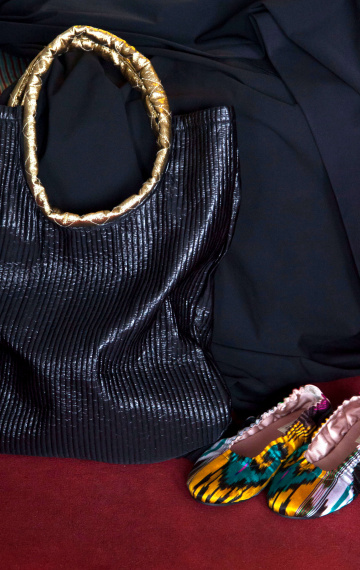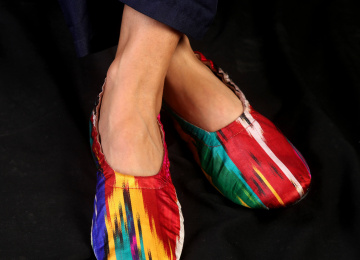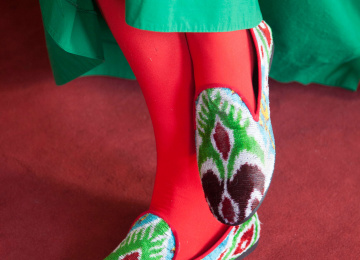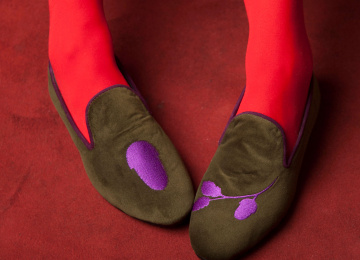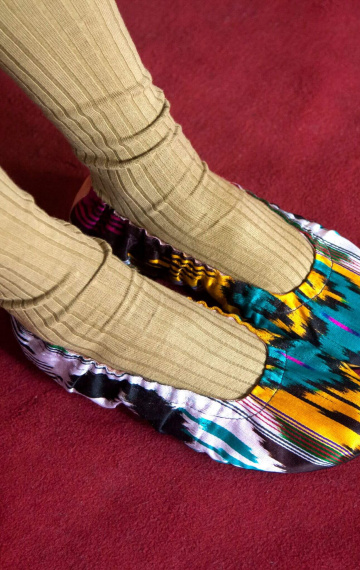Amidst the contemplation about what to do with the access they had to exquisite and premium textile scraps, art expert Sophia Lapiashvili and marketing specialist Maka Noselidze embarked on an unexpected journey: they founded a company in the middle of the COVID-19 pandemic and used the EU4Business support to help expand to new markets.
Giving new purpose to things people no longer loved as a core business idea
Lapiashvili has always dreamt about giving new purpose to things people no longer loved. She believed, the unknown path to creativity would forever ignite her passion, providing her with boundless opportunities to innovate and transform. That’s why the two friends decided to create eco-friendly shoes and accessories.
Next, they spent six months looking for a shoemaker who would create high-quality items with textile scraps and secondary fabrics. In December 2020 they came out with the first shoe collection and Usuli started its journey in Georgian fashion industry where sustainability is still not a common approach.
Derived from an ancient Georgian word representing elegance and beauty, the company name Usuli perfectly encapsulates the brand's identity. At the core of their product line are vibrant shoes adorned with various patterns and ornaments, showcasing the company's distinctive style. In addition, Usuli also offers a range of handbags and belts to complement their footwear collection. All of the products offered by Usuli are crafted from textile scraps sourced from designers or design studios after they have completed sewing garments, as well as secondary fabrics commonly found in households throughout Georgia.
"People frequently possess old fabrics, such as table covers or thin blankets, that they no longer utilize. Often, they are uncertain about what to do with these items. But at Usuli we can give them new purpose,” Sophia Lapiashvili explained, noting they often go from family to family to collect secondary fabrics.
The practice of using textile leftovers and secondary fabrics is what makes Usuli’s products different from what’s available on the market. They carefully curate a unique combination of individual pieces for each shoe, ensuring that no two pairs are exactly alike. While this may be unconventional for customers, it is also their distinct advantage. The uniqueness of each shoe showcases the unmistakable "Usuli touch”, setting them apart from other producers and adding to their appeal.
“In the beginning, it was a challenge for us to deal with this aspect. Frequently, people would send us photos, inquiring if we could create a similar pair of shoes. We had to decline those requests since we no longer possessed those particular fabrics,” Lapiashvili said. “But then we began to see it as our strength.”
New pathway for growth with EU4Business
Following the pandemic, Usuli experienced a decline in sales. Lapiashvili suggested that this could be attributed to the fact that online shopping served as a therapy for many people amidst worldwide closure. As the company was experiencing difficulties, it found a new pathway with the help of EU4Business and Eurochambres. This newfound avenue holds the potential to pave the way for exciting collaborations beyond the borders of Georgia.
Usuli participated in the project “Enhancing Export Capacities for Georgian and Estonian SMEs – Export Design” supported by the EU4Business: Connecting Companies (EU4BCC) project under the EU4Business umbrella and took part in the mobility program for creative SMEs in 2023. Lapiashvili went to Vilnius, Lithuania in May 2021 and chose a shop where they could effectively display and sell Usuli’s products in the nearest future.
Within the same project, in collaboration with a local designer, she embarked on a creative partnership to develop a captivating design object specifically for a window project, which was to be prominently exhibited during the Kaunas Design Week. As they were thinking about the concept for the display, they came across a Georgian book full of poems from different authors.
“Within that book, a poem titled "Chair" resonated deeply with us. Coincidentally, our project revolved around a chair covered in fabrics, and we were contemplating how to imbue it with personification. The words of the poem precisely captured the essence of our vision, creating a remarkable alignment between our thoughts and the inspiration we sought,” Lapiashvili remembered.
The poem, by Georgian author Lia Liqokeli, is about a chair with a broken leg that worries the owner will throw it away. Instead, the owner decides to keep it.
“I'll cover you with my clothes so you don't get cold
sit and wait for me
I will definitely need you:
Once I break all the legs of thought
Give me your remaining legs.”
Lapiashvili's design object garnered significant attention during the Kaunas Design Week, captivating a wide audience and receiving extensive coverage in the local media. As a result of this exposure, she decided to leave some of Usuli's products in one of the local stores for sale, expanding their presence in the market. Additionally, this success has opened up new avenues for collaboration and partnership opportunities.
“With the EU4BCC project came new contacts and new plans,” Lapiashvili explained. “This is the new incentive for us to move forward and start exporting Usuli’s products.”
***
EU4Business: Connecting Companies (EU4BCC) project is funded under the EU4Business initiative of the European Union and implemented by Eurochambres, an association that provides support to local chambers and business communities in the European Union and other regions. The project aims to foster sustainable economic development and job creation in the Eastern Partnership (EaP) countries by facilitating the growth of small- and medium-sized enterprises (SMEs). Specifically, EU4BCC focuses on key sectors such as bio-food, creative industries, textiles, tourism, and wine, providing valuable support to enterprises operating within these industries.

